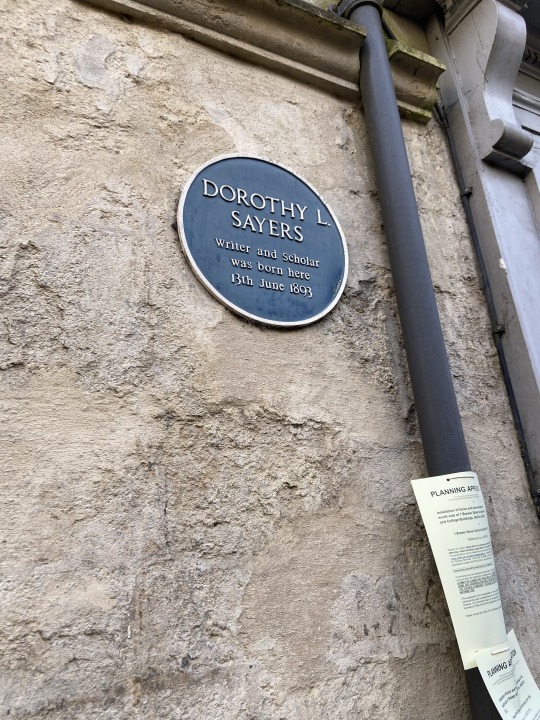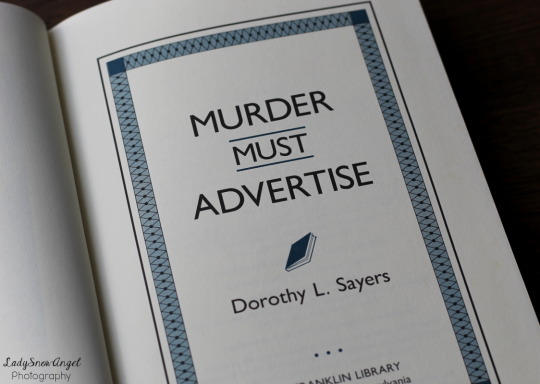Text


Whilst in Oxford, I also did a bit of homage-paying to Dorothy L Sayers—found Balliol on purpose, stumbled across her birthplace on accident. Both delightful!
86 notes
·
View notes
Text
Got a question about Lord Peter Wimsey
Please spread this because it's applicable to about five people and I would like to find all of them.
257 notes
·
View notes
Note
i'm reading all the peter wimsey novels because someone recommended gaudy night and that's how i work, and now i'm up to the nine tailors and just finished murder must advertise (my favorite so far), but i found it really hard to get through have his carcase, which was odd since i loved harriet vane so much in strong poison. even the characters seemed to bugger off at the end of have his carcase instead of tying up all the storylines and sayers seemed disengaged after the first act or two. i liked the parts with peter and harriet, even the two chapters that are 99% cipher, but everything else felt weak. did you enjoy this one/why or why not? do you have a favorite of the wimsey novels other than gaudy night?
I may be inducing a fight by saying this but I think Have His Carcase is one of Sayers' weakest novels, and certainly the weakest of those featuring Harriet Vane. I tried to re-read it recently and couldn't get very far into it, and I'm a huge fan of Sayers. I think it's also a necessary book in order to create a complete story for them -- but I don't know that it's necessary to read it in the modern era, and certainly not necessary to re-read it.
(My other picks for least enjoyable: Five Red Herrings and Nine Tailors, both of which are visibly her attempts to write like Agatha Christie, one of her literary heroes -- and they're not bad books, I just don't like Agatha Christie style "clockwork" mysteries, which tend to sacrifice personality to logistics. I suspect this may have impacted Carcase somewhat. We will come back to this.)
Gaudy Night is actually not my favorite overall -- I think it's one of her best, but Murder Must Advertise is my favorite and in fact the first one I read. Which is hilarious because Peter spends a significant amount of time Not Being Peter Wimsey in it, but it's just such a combination of things I love. Advertising (which Sayers worked in and which she also clearly loved writing about), secret identities, crime rings, a hint of romance, office gossip...
Anyway, Carcase. I think the problem is that to get from Strong Poison to Gaudy Night, there has to be a bridge, and it has to be kind of an unpleasant one, and thus you get Have His Carcase. One of the major points of Harriet's arc is that Sayers wanted to contravene the "damsel rescued by the hero" narrative. Not so much because she believed women should save themselves or not, but because she believed that a relationship based on that kind of inequality, where one partner was grateful (or was expected to be grateful eternally) for being saved, was inherently unhealthy and unsustainable, and it was also a super common narrative at the time she was writing. This reaction to the narrative is most visible in her unfinished novel Thrones, Dominations -- which was finished after her death by Jill Paton Walsh, and I'm not a huge fan of the end product, but I've seen the original manuscript held at Wheaton and it's evident that this was a theme before anyone else took over, it wasn't forced into the plot.
In any case, Sayers had to get Harriet and Peter from victim and rescuer to equal footing, and while Gaudy does a lot of lifting in that regard, it doesn't do enough on its own, there had to be a previous groundwork laid. In a sense I'm glad that the grappling they have to do, which is sensible and intelligently written but also really unromantic, was done in Have His Carcase, so that it doesn't intrude more than briefly into Gaudy Night. Carcase is a lot about Harriet setting boundaries and testing whether Peter will cross them, and Peter reacting (sometimes poorly) to someone challenging him in ways he's unaccustomed to being challenged. Carcase is two people finding out the worst parts of each other so they can work out that they love the reality of each other anyways, which is what they're doing in Gaudy. But we have to witness it in Carcase, which is unpleasant. At least for me.
As she matures as an author and gains more power over how she's published, you can see Sayers trying new things -- after Bellona (another fave) she gets very literary with Strong Poison, and then seems to swing between these kind of torturous attempts at Christie's style (Herrings, Tailors) and incredibly sensitive, emotionally delicate books like Murder Must Advertise and Gaudy Night. Carcase is a weird combination of the two, where she seems to be applying the dispassionate Christie style to a book that wants to be Gaudy Night but can't be.
Anyway, even her less enjoyable books can still be pretty fun, and it's worth it to have books like Murder Must Advertise and Strong Poison, and the thrilling romance of Gaudy Night. But yeah, Carcase is a bit of a slog to get through.
#have his carcase#lord peter wimsey#harriet vane#the unsentimental romance#copperbadge#strong poison#the unpleasantness at the bellona club#five red herrings#the nine tailors#gaudy night#thrones dominations#agatha christie#i think the murder in have his carcase is rather ridiculous but love the prickly harriet-peter interactions#murder must advertise is probably sayers's most purely entertaining book#but i think the drug subplot drags it down a bit#and nine tailors is one of my favorites and i would class it as one of her more literary novels#fascinating how much experiences can differ
144 notes
·
View notes
Text

Murder Must Advertise + Coffee
57 notes
·
View notes
Text
if there's one thing about classic literary detectives it's that they are not conventionally attractive. doyle told sidney paget to stop drawing holmes so pretty. christie was like "let me introduce you to this short pudgy balding man who is retirement age and i hate him." sayers compares wimsey to maggots on literally the FIRST PAGE
i love it. i love them. stop casting hot people in these roles. we need our detectives to be Charmingly Weird-Looking
#dorothy l. sayers#lord peter wimsey#agatha christie#hercule poirot#sir arthur conan doyle#sherlock holmes#sidney paget
2K notes
·
View notes
Text
I looked into this once and Bujold said that she had not read Dunnett. But Sayers is one of the dedicatees of A Civil Campaign.
I just realized that Ekaterin Vorkosigansaga's maiden name is Vorvayne because the structure and nature of her and Miles's romance are heavily inspired by Sayers's Wimsey novels, in which the romantic heroine is called Harriet Vane.
#harriet vane#ekaterina vorkosigan#vorkosigan saga#lois mcmaster bujold#dorothy l. sayers#literary influences#strong poison#the wimsey-lymond spectrum
50 notes
·
View notes
Text
Dorothy Sayers in 1932: "Church clocks and bodies in belfries are rather overdone lately."
Dorothy Sayers in 1934: lol jk I have a new special interest so strap in
136 notes
·
View notes
Text
Fugitive Telemetry ends on such a Dorothy L Sayers vibe. yes, the mystery is solved, but the dead can't be brought back, the harm can't be undone, and the societal rift that led to the crime in the first place is unchanged, so similar injustices will KEEP happening. and if only the detective had been a little smarter, a little faster, a little more capable of seeing past their own biases.... a victory, but filled with self-loathing and existential despair.
thank goodness for friends who drag you to musical theater.
59 notes
·
View notes
Text
#I read Busman's Honeymoon on a trip where I shared a room with my parents#I have up half the night with the lamp on quietly having EMOTIONS#trying to process all my feelings without waking them up (via @agreyeyedgirl)
Finished Gaudy Night. Let me assure you that the only reason I'm not screaming is that it's quarter past midnight and my parents are sleeping.
63 notes
·
View notes
Text
The whole first paragraph is worth quoting for its snarky conclusion:
"The best remedy for a bruised heart is not, as so many people seem to think, repose upon a manly bosom. Much more efficacious are honest work, physical activity, and the sudden acquisition of wealth. After being acquitted of murdering her lover, and, indeed, in consequence of that acquittal, Harriet Vane found all three specifics abundantly at her disposal; and although Lord Peter Wimsey, with a touching faith in tradition, persisted day in and day out in presenting the bosom for her approval, she showed no inclination to recline upon it."

This really ought to top every, “Best Opening Lines,” list. The 21st century reading public is sleeping on Dorothy L Sayers.
#have his carcase#harriet vane#lord peter wimsey#opening paragraphs#i'm still committed to doing daily 'have his carcase' in 2026#when it enters us public domain#(it's unnerving how soon that is)#(not entering public domain [which is always welcome] but 2026)#hopefully tumblr will survive that long#and i will come up with a catchier title for the endeavor before then
594 notes
·
View notes
Text


Still thinking about Them (Peter/Harriet fancasts)
#not my personal preference but i do appreciate it#lord peter wimsey#harriet vane#fan casts#michelle dockery#i don't think i recognize the guy
106 notes
·
View notes
Text
when a character is written inconsistently because nobody thought about it that hard and you're like it's time for me to get in there.. and think about it that hard
16K notes
·
View notes
Text
#harriet vane chic (via @harrietvane)

William Rothenstein (British/English, 1872–1945) • Portrait of Gladys Calthrop • 1922
731 notes
·
View notes
Text
But there was a period of friction, when “hello” was spreading beyond its summoning origins to become a general-purpose greeting, and not everyone was a fan. I was reminded of this when watching a scene in the BBC television series Call the Midwife, set in the late 1950s and early 1960s, where a younger midwife greets an older one with a cheerful “Hello!” “When I was in training,” sniffs the older character, “we were always taught to say ‘good morning,’ ‘good afternoon,’ or ‘good evening.’ ‘Hello’ would not have been permitted.” To the younger character, “hello” has firmly crossed the line into a phatic greeting. But to the older character, or perhaps more accurately to her instructors as a young nurse, “hello” still retains an impertinent whiff of summoning. Etiquette books as late as the 1940s were still advising against “hello,” but in the mouth of a character from the 1960s, being anti-hello is intended to make her look like a fussbudget, especially playing for an audience of the future who’s forgotten that anyone ever objected to “hello.”
Because Internet, Gretchen McCulloch
8K notes
·
View notes
Text
“One First of April, the question had arrived from Paris in a single Latin sentence, starting off dispiritedly. “Num…?”- a particular which notoriously “expects the answer No.” Harriet, rummaging the Grammar book for “polite negatives,” replied, still more briefly, “Benigne.””
— -Gaudy Night, Dorothy L Sayers (via summersanginme)
484 notes
·
View notes
Text
“I take it, Harriet, that you have no new answer to give me?”
“No, Peter. I’m sorry, but I can’t say anything else.”
“All right. Don’t worry. I’ll try not to be a nuisance. But if you could put up with me occasionally, as you have done tonight, I should be very grateful to you.”
“I don’t think that would be at all fair to you.”
“If that’s the only reason, I am the best judge of that.” Then, with a return of his habitual self-mockery: “Old habits die hard. I will not promise to reform altogether. I shall, with your permission, continue to propose to you, at decently regulated intervals—as a birthday treat, and on Guy Fawkes Day and on the Anniversary of the King’s Accession. But consider it, if you will, as a pure formality. You need not pay the smallest attention to it.”
“Peter, it’s foolish to go on like this.”
“And, of course, on the Feast of All Fools.”
“It would be better to forget all about it—I hoped you had.”
“I have the most ill-regulated memory. It does those things which it ought not to do and leaves undone the things it ought to have done. But it has not yet gone on strike altogether.”
–Dorothy L. Sayers, Gaudy Night, Chapter IV, 1936.
616 notes
·
View notes


